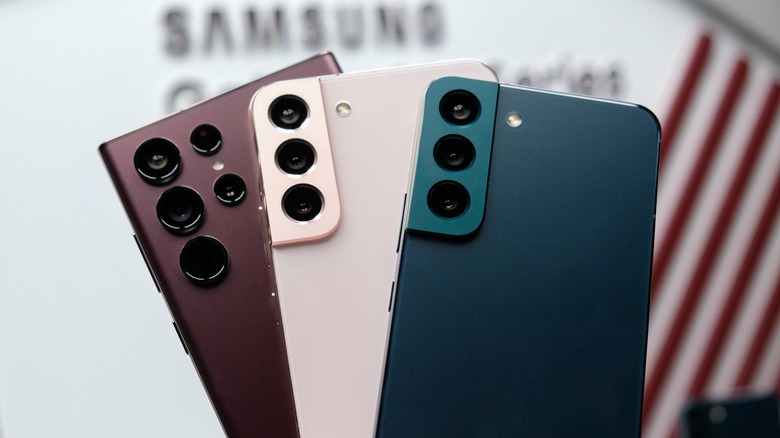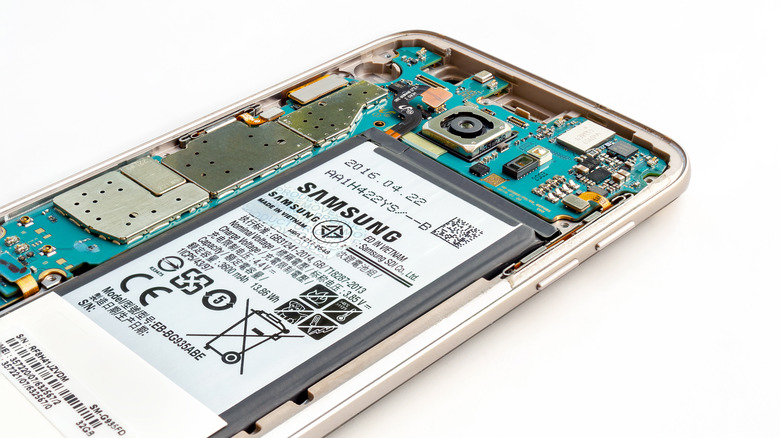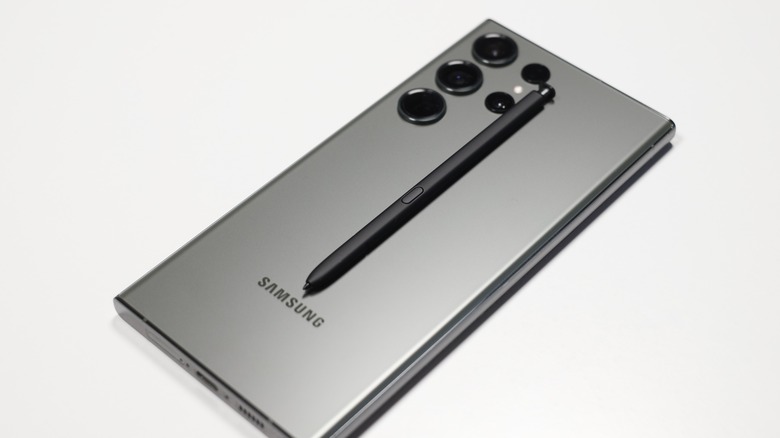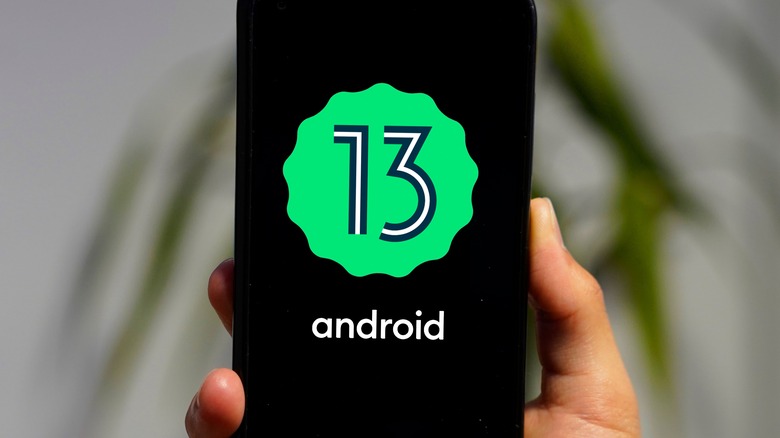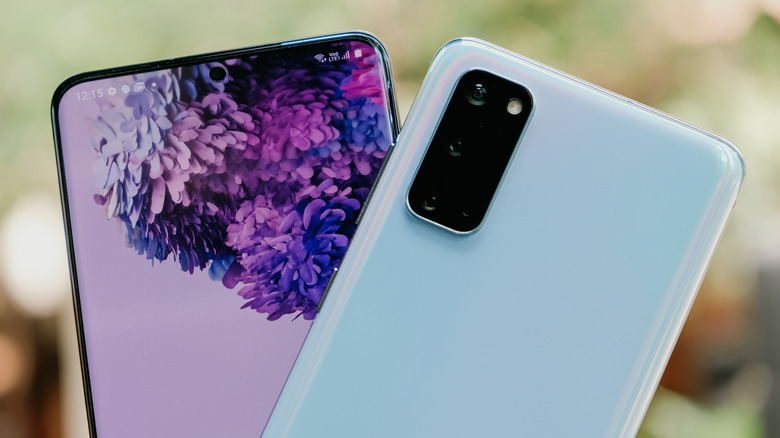Here's How Long Samsung Phones Last
We may receive a commission on purchases made from links.
Are you planning to buy a new Samsung smartphone and want to know how long it will last? Well, you are not alone. As smartphone prices rise annually, investing in a model with the latest features that will last several years is wise. Previously, we surveyed our readers to understand which brand they think makes the most reliable Android smartphone, and 63.44% of the respondents voted for Samsung, a testament to the reputation the company has managed to create over the years. At the time of writing, Samsung has the highest global market share for Android smartphones. However, there's another reason why people want to know how long their phones will last.
Though Samsung releases new smartphones every year, the differences between these models are starting to fade. For instance, if you look closely at the specifications of the Galaxy S23 Ultra, Samsung's top-of-the-line phone for 2023, you'll find that they are similar to those of the Galaxy S22 Ultra, with minor changes in the camera and the chipset.
The similarities increase with the regular Galaxy S23, which is basically the same smartphone as the Galaxy S22, albeit with an improved processor. This trend also exists in mid-range smartphones by the company, such as Galaxy A52 and Galaxy A53. Hence, without worthy updates, people want to retain their current smartphones for longer, but how long will they truly last?
A phone's life depends on its hardware
The idea of how long a Samsung phone lasts generally refers to the duration for which it sustains peak performance. While going through the specifications of a phone, you'll likely read about its processor, RAM, and storage. These components give you an idea of the phone's overall performance. However, these components also determine the longevity of a phone. The performance of all hardware components of a smartphone, including the processor and memory, degrade over time. It doesn't matter whether you get a Galaxy A53 or the S23; the components are susceptible to wear and tear with usage over the long term.
The wear damage is more evident on affordable phones due to less capable chips and lower storage. New app updates or operating system updates demand more resources, increasing the load on the aging hardware. Other factors affecting a phone's life include usage patterns and environmental settings. An entry-level Samsung smartphone should easily last two years, while a flagship should survive three to four years before showing signs of aging.
Another crucial component is your phone's battery. With regular usage, the lithium-ion batteries on Samsung Galaxy phones lose their maximum charge retention capacity, decreasing the effective battery life. Generally, the batteries on Samsung phones retain about 80% of their capacity for two years of usage or roughly 500 charge cycles.
Samsung phones are more durable than ever
Over the years, Samsung has improved the build quality of its smartphones. The latest Galaxy S23 series features Corning Gorilla Glass Victus 2 on the front and the back, making it more resistant to drop damage. Even mid-range Samsung phones, like the Galaxy A53, come with Gorilla Glass 5. The last four generations of flagships, from the Galaxy S23 to the Galaxy S20, all come with IP68 water-resistance rating, which increases their overall durability.
Further, users can purchase third-party accessories that protect their smartphones from physical damage or reduce the degree of damage, including protective covers, screen guards, and camera lens protectors. Such accessories save you in repair costs and increase your phone's life. Samsung also offers smartphone insurance, wherein users can pay a one-time or an equated monthly fee in exchange for repair or replacement services, as needed.
Gone are the times when accidental phone damage could not be repaired. It's easier to fix a phone than ever, be it screen damage, back-glass breakage, or a camera lens crack. The cost of spare parts has come down, as well. On top of that, Samsung Galaxy S20, S21, and S22 users can now order self-repair kits on the company's official website. You can even reach out to Samsung Support with any problems.
Software support is a crucial factor
Software updates play a significant role in a phone's life, as they unlock new features, provide the best experience, and improve your phone against online threats. Although Samsung wasn't known for giving the most extended software support, the company has changed its approach in the last few years, committing to more years of the latest Android updates.
A few years ago, Samsung offered two years of software updates on its smartphones. However, in 2020, the company promised to provide three generations of Android updates for select Galaxy devices, like the Note 20 series and the Galaxy Z Fold 2. The following year, Samsung extended the number of security updates from three to four years for devices launched in 2019, including the Galaxy S10 series, Galaxy S21 series, and some mid-range smartphones like the Galaxy A51 5G and the Galaxy A71 5G.
However, in 2022, the company pledged to release four generations of operating system upgrades and up to five years of security upgrades for select Galaxy models. The Galaxy devices that are eligible to receive four years of One UI upgrades (based on the latest Android version) include the Galaxy S21 (and newer Galaxy S series models), Galaxy Z Fold 3, and Galaxy Z Flip 3 (and newer Galaxy Z models, too). Hence, if you've got a Galaxy S21 running on Android 13, you'll get two more major Android updates, whereas the latest Galaxy S23 will be good for another four years.
It all comes down to how you use your phone
It's not like Samsung doesn't provide security updates to older phones. Per a report published by Phone Arena, Samsung has provided monthly security updates to 2019's Galaxy Note 10 and quarterly updates to 2018's Galaxy S10. It is worth noting that a phone doesn't stop functioning if it doesn't get Android or security updates, at least for a few years. However, using such a phone is unsafe as it no longer gets security updates.
To summarize, your Samsung phone's life depends upon its hardware, how you use your smartphone, and the software updates released by the company. But what if we tell you that you can do a few things to increase its lifespan even further? First, always keep some portion of your phone's storage empty, as it helps the flash drive on your phone to maintain maximum read/write speeds. Samsung also recommends keeping your smartphone's battery between 20% and 80% to maximize its life, increasing your phone's life. You should also avoid using your smartphone in environments where the temperature is too low or too high.
